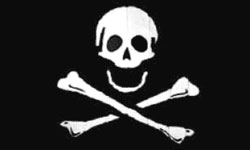The strength of street knowledge

The Pirate's Dilemma: How Youth Culture is Reinventing Capitalism (buy
Matt Mason (blog)
240 pages
Free Press
When a former UK pirate DJ writes a book on piracy and uses an epigraph from Dr. Dre ("You are now about to witness the strength of street knowledge"), you'd be forgiven for expecting an anarchist's screed. But Matt Mason's recent book, The Pirate's Dilemma, isn't some mimeographed broadsheet written by a bomb-thrower; published by Simon & Schuster in the US and by Penguin in the UK, the book has a more complicated vision than "Copyright bad! Piracy good!" As the subtitle makes clear, this is a book about "How Youth Culture is Reinventing Capitalism," not about how it is replacing the market with an anarcho-socialist commune.
That doesn't mean that Mason wants to avoid provocation. Within three pages, he refers to pirates as "society's unsung heroes" and an "an invisible army who started a revolution with pens and spray cans." It's a bold way to describe graffiti artists, pirate radio DJs, and P2P downloaders, but Mason sees these groups as the people who are "hacking into the hull" of the good ship S.S. Capitalism. The question posed by pirates is simple but stark: "Are they a threat to be battled, or innovators we should compete with and learn from?"
For Mason, the answer is clear: pirates are the real innovators. Instead of posing a threat, they are in fact showing established companies what the market wants and providing companies willing to learn from them how to move forward. Think of piracy as free market research data.
Hoisting the Jolly Roger
 Who are the pirates being praised here? Mason's definition of a pirate is straightforward: "a pirate is essentially anyone who broadcasts or copies someone else's creative property without paying for it or obtaining permission."
Who are the pirates being praised here? Mason's definition of a pirate is straightforward: "a pirate is essentially anyone who broadcasts or copies someone else's creative property without paying for it or obtaining permission."
Now, some acts of piracy are "quite simply theft," but others are more complicated than that. American cinema and cable television were founded as outlaw institutions (there's a reason that Hollywood flourished as far away from DC and New York as it was possible to get). Piracy, in Mason's view, is actually an American institution that the Founders would have been proud of. "During the nineteenth century Industrial Revolution, the Founding Fathers pursued a policy of counterfeiting European inventions, ignoring global patents, and stealing intellectual property wholesale."
The situation lasted for so long that Dickens was still complaining about it when he toured the US and found pirated editions of his books everywhere. Americans were so known for piracy that they were eventually branded Yankees, from the Dutch "Janke," slang for a pirate.
But the mere existence of a practice doesn't mean it's a good thing; while piracy may be good for those who don't have to pay for something, it's less immediately clear how it might benefit the broader economy. And how could it help the very companies who are being hurt by it? Here is Mason's answer, one worth quoting at length.
By short-circuiting conventional channels and red tape, pirates can deliver new materials, formats, and business models to audiences who want them. Canal Street moves faster than Wall Street. Piracy transforms the markets it operates in, changing the way distribution works and forcing companies to be more competitive and innovative. Pirates don't just defend the public domain from corporate control; they also force big business and government to deliver what we want, when we want it.
It's an argument worth considering. Would we have iTunes, eMusic, Amie Street, and the Amazon digital music store without the pressure brought by the pirates? It's hard to say definitively, but piracy has certainly given the entire digital download experiment a sense of urgency. Recall the earliest, label-controlled experiments like pressplay and MusicNet... and shudder. How much innovation would the labels have allowed in the music space without the pressure of KaZaA, Gnutella, and especially the original Napster?
The pirates certainly were out in front on the music issue, dragging the labels kicking and screaming into an online age. As Mason puts it, "Pirates highlight areas where choice doesn't exist and demand that it does."
reader comments
0